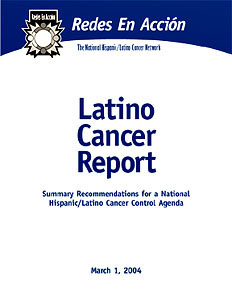March 1, 2004
 Inadequate access to cancer screening and care is the number one cancer issue for the nation's 38 million Hispanics/Latinos, according to a report recently issued by Redes En Acción.
Inadequate access to cancer screening and care is the number one cancer issue for the nation's 38 million Hispanics/Latinos, according to a report recently issued by Redes En Acción.
In its summary recommendations for a national Hispanic/Latino cancer control agenda, the Redes En Acción Latino Cancer Report ranks the cancer issues of greatest relevance to this country's Latino population as follows:
- Access to cancer screening and care
- Tobacco use and cancer
- Status and communication of cancer risk
- Association of infectious agents with certain types of cancer
- Cancer survivorship and health-related quality of life
Access to care is a particularly significant problem for Latinos. According to the U.S. Census Bureau, Latinos are uninsured at a rate more than three times higher than non-Hispanic whites (32.4% vs. 10.7%).
The Latino Cancer Report includes a series of research recommendations for the priority issues, as well as education, training and outreach recommendations for cancer prevention and control. In addition, the report lists the most important cancer sites, in order of their significance to Latinos as: 1) breast, 2) cervical, 3) lung, 4) colorectal, 5) prostate, 6) liver and 7) stomach.
"The consensus recommendations found in the Latino Cancer Report are intended to help shape a national agenda on Hispanic/Latino cancer prevention and control issues," said Amelie G. Ramirez, DrPH, Redes En Acción Principal Investigator. "More specifically, the aim of this report is to assist Redes En Acción in its goals of promoting Hispanic/Latino cancer research, training and public education, as well as provide advisory guidelines for national, regional and local policy makers."
The Latino Cancer Report represents four years of research and prioritization and the input of hundreds of scientists, health care professionals, leaders of government agencies and professional and community-based organizations, and other stakeholders in Hispanic/Latino health. The process included extensive involvement of Redes En Acción's National Steering Committee and six Regional Community Advisory Committees, and a survey of 624 key opinion leaders in Hispanic/Latino communities throughout the country.
"Latinos are the largest and fastest-growing minority population in the United States," Dr. Ramirez said. "As this population expands and ages, it is imperative that the resources and strategies employed in the war against cancer be targeted as precisely as possible for maximum effect.
"Redes En Acción believes this Latino Cancer Report will provide a useful tool for all individuals and organizations engaged in this effort."
What Is Redes En Acción? Redes En Acción is a major NCI-supported initiative to combat cancer among Latinos through a nationwide network of community-based organizations, research institutions, government health agencies and the public. Core activities include promoting cancer training and research opportunities for Latino students and researchers, generating research projects on key Latino cancer issues, and supporting cancer awareness activities within the Latino community.
The initiative is coordinated by the Baylor College of Medicine in Houston and San Antonio, with regional network centers in San Antonio, New York, Miami, Chicago, San Francisco and San Diego.



